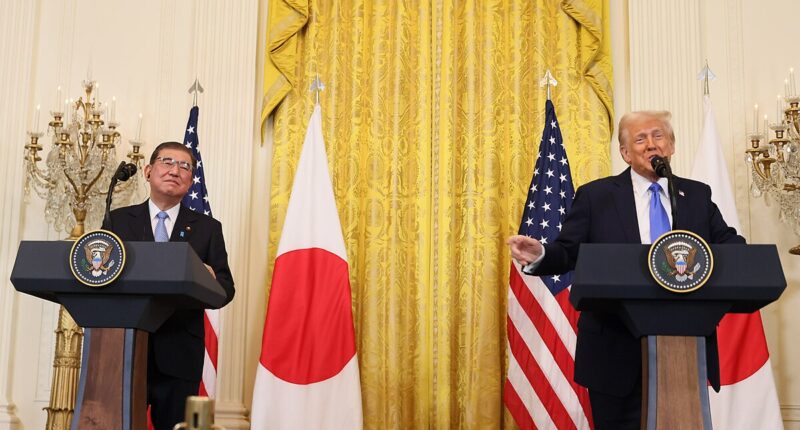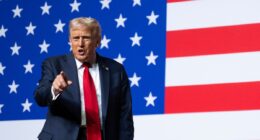Since returning to office, President Trump has sought to advance a foreign policy agenda that places American interests first. A major component of this agenda has been to strategically pressure U.S. allies and partners to increase their defense budgets to counter common threats and usher in a more stable security environment.
That objective appears to be top of mind for Under Secretary of Defense for Policy Elbridge Colby, who has been instrumental in forwarding the administration’s agenda on the world stage. In an Aug. 15 tweet, the high-ranking Pentagon official noted, “It’s common sense that all allies, especially in Asia, need to pull their weight.”
“That’s how we get peace through strength and sustainable collective defense,” Colby wrote. “Fortunately, many of our allies, led by Europe, get it: The route to sustained peace is everybody doing their part.”
Colby went on to cite remarks from New Zealand’s defense minister, who criticized her nation, Australia, and other Indo-Pacific countries for their failure to invest in their collective national defense. He notably referenced reported comments the Kiwi official made about the rising power of Red China throughout the region.
Since taking the reins of Chinese politics more than a decade ago, Chairman Xi Jinping has steadily expanded Beijing’s military might and projection to counter (and ultimately defeat) American influence in East Asia. Under his supervision, the Chinese Communist Party has made significant investments in the People’s Liberation Army, whose personnel have undertaken increasingly aggressive maneuvers toward U.S. assets and partners across the region in recent years.
The Trump administration certainly deserves credit for its efforts to galvanize its Asian allies to take their national defense and the China threat seriously. But getting these nations to do what needs to be done, however, may prove more difficult than anticipated.
As with any modern democratic power, many Asian countries are often constrained by the reality of domestic politics.
In Taiwan, for example, President Lai Ching-te’s administration recently proposed increasing the island’s defense budget by 23 percent next year, a figure that would raise its overall defense spending “to more than 3.3 per cent of GDP,” according to the Financial Times. The move falls in line with requests from Trump officials like Colby, who have pushed Taipei to increase its defense budget to deter a future Chinese invasion.
The potential problem for Lai — a member of the Democratic Progressive Party — is that the proposed spending increase must first be approved by the Yuan legislature, which is currently controlled by the opposing Kuomintang party. Considered to be more China-friendly, the KMT-run parliament froze billions of dollars’ worth of defense spending earlier this year, further muddying the waters on whether it will be more receptive to increases this time around.
Similar uncertainty can also be seen in Japan, which, much like Taiwan, has faced its share of Chinese military aggression in recent years.
The longtime ruling center-right Liberal Democratic Party and its coalition partner recently suffered defeat in the nation’s elections for its upper house of parliament, which came nearly a year after the party lost its governing majority in the lower house. While Prime Minister Shigeru Ishiba has sought to raise the country’s defense spending to counter regional threats like China and North Korea, the political instability stemming from his party’s electoral losses throws the potential for future defense spending increases into question.
Meanwhile, South Korea’s recent abrupt leadership change could potentially affect Trump’s reported desire for Seoul to up its military spending. Following the impeachment and ouster of conservative President Yoon Suk Yeol several months ago, South Koreans elected liberal Lee Jae-myung, who is seemingly more pro-China than his predecessor. (Lee is scheduled to meet Trump for their first summit in Washington this week.)
Much like with Taiwan and Japan, it remains to be seen whether South Korea will ultimately increase its defense spending and how Lee will continue to balance Seoul’s relationships with the United States and China.
President Trump and his team should be commended for recognizing the growing China threat and ensuring a free and open Indo-Pacific. The Chinese Communist Party is a hostile actor whose increasing aggression jeopardizes the safety of U.S. personnel in East Asia and American regional dominance.
Getting America’s partners to overcome their domestic hurdles and get on board with this venture is going to require continued pressure and high-level negotiations from the president and his administration. For the sake of peace and stability, let’s hope their strategy pays off.
Shawn Fleetwood is a staff writer for The Federalist and a graduate of the University of Mary Washington. He previously served as a state content writer for Convention of States Action and his work has been featured in numerous outlets, including RealClearPolitics, RealClearHealth, and Conservative Review. Follow him on Twitter @ShawnFleetwood









